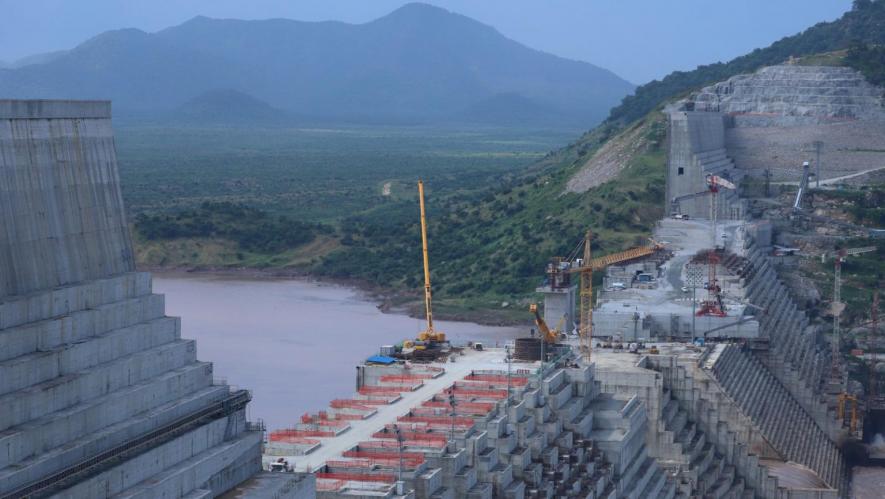US Allies Egypt and Ethiopia Squabble Over Nile Ignoring Bigger Threats

The US may soon take sides in a potential water war over the Nile River. The $4.5 billion Grand Ethiopian Renaissance Dam (GERD) is reaching the mature stage of construction, with Ethiopia announcing its intent to begin storing water that Egypt would prefer to grow its crops with. Should combat ensue, Washington will likely choose between two of its oldest and more problematic proxies: Egypt and Ethiopia—with oft-embattled Sudan caught in the middle.
President Trump’s options include his “favorite dictator,” Egyptian President Abdel Fattah el-Sisi, and Ethiopia’s young modernising Nobel Prize-winning prime minister Abiy Ahmed. Sisi’s Egypt has long been America’s number two recipient of military aid and ostensible ally in the fight against regional “terror.” Abiy leads a self-styled Ethiopian rising power—with Africa’s fastest-growing economy—that Washington views as a pivotal partner in the strategic Horn of Africa. Neither state has a stellar human rights record or reputation for regional harmony.
The Nile is the world’s longest river and flows 4,000 miles through 11 countries, and its terminus in Egypt has helped propagate one of the largest population centres on the African continent for thousands of years.
The Nile fulfils 97 per cent of Egypt’s water needs, and 95 per cent of Egyptians live along the river or within its delta, but the struggle transcends resources. There was much truth in President Sisi’s dramatic proclamation at the United Nations in September 2019: “The Nile is a question of life, a matter of existence to Egypt.”
Ethiopia, on the other hand, rejects Egyptian intransigence as “hydro-hegemony” and asserts a national right to dam the Nile and thus “light up” its swelling population. Indeed, Ethiopia’s 6.4-GW GERD could more than double power capacity in a country where 60 per cent of the people still lack electricity. This, plus the predicted largesse from energy sales to neighbouring countries, would thereby fuel Addis Ababa’s ongoing modernisation project and allow Ethiopia to take its destined place as a regional powerhouse. That the young energetic Prime Minister Abiy—with his big promises—faces an election in August adds a political calculus to the treacherous dispute.
Ultimately, climate-induced desertification and drought, combined with overpopulation—more than 100 million and counting in both countries—could override the human drama and become the most pressing threat. The Nile River dispute highlights humanity’s dilemma in microcosm: the crisis demands fresh transnational unity, but old geo- (and hydro-) politics continue to predominate.
Long Shadows
Military and diplomatic strategists still study the ancient Greek chronicler Thucydides’ famous assertion that nations mainly fight over “fear, honour, and interest.” All three are at stake in the Nile damming dispute. Egypt is terrified that the GERD will deny its large and politically unstable populace their water lifeline in an otherwise desert nation. For Cairo, the upstream mega-dam represents a symbolic slight to its honour and proof positive of Ethiopia’s master plan to reduce and replace Egypt as the regional powerhouse. On the other hand, facing reelection, Ethiopian Prime Minister Abiy exudes calculated toughness and vocalises the crisis as a matter of national “honour.”
Each nation’s read of the past informs present policy. Egypt invaded Ethiopia in the 1870s, and has threatened a repeat for over a century. Ethiopians view that past assault and recent threats as evidence, according to one of their negotiators, of Egypt’s long-term mission to turn their country into a “hydrological colony.”
For his part, Sisi’s aggressive framing of an Ethiopian peril is consistent with equally bellicose threats from past Egyptian leaders. In 1978, when Ethiopia proposed a series of dams, President Anwar Sadat apocalyptically threatened, “We are not going to wait to die of thirst in Egypt… We’ll go to Ethiopia and die there.” Just as ominously, some current Egyptian officials have recently discussed bombing the GERD outright. In the meantime, Sisi has waged asymmetric war on Ethiopia, fostering ties with Abiy’s internal adversaries and shipping arms to his neighbouring opponent, South Sudan.
Ethiopia’s prime minister will not be cowed. In October 2019, Abiy told lawmakers that “No force could prevent” completion of the dam, and if necessary he would have “millions readied” for war. Whether this claim is true or not, Abiy has also readied a potential justification for mobilisation that deftly taps into Ethiopia’s sense of historic victimisation. For years, Ethiopian officials have accused Egyptian intelligence of fostering anti-government protests and armed rebellion within the country.
Enter the Artful Dealmaker
The United States has some leverage in any dispute between two regional allies. Nonetheless, how an ever-erratic Trump prioritises US interests and whether his involvement proves salve or accelerant is unclear. The crisis unfolds as the eternally self-aggrandising “leader of the free world” regularly suggests—usually at partisan rallies—that he deserves a Nobel Peace Prize for limited mediation efforts since November 2020. So far both sides suspect Trump favours the other, and nothing permanent has stuck.
Unsurprisingly, Trump sidelined engagement experts in the State Department and handed the Nile portfolio to Steve Mnuchin at the Treasury. In March, through their influential link to the International Monetary Fund and World Bank—both significant funders of Prime Minister Abiy’s modernisation—Treasury officials pressured Ethiopia to relent; no doubt they hinted at financial costs to intransigence. Instead, Ethiopia balked and withdrew from the negotiations for months—arguing that Trump was hopelessly biased toward his “favourite dictator [Sisi].” Former US ambassador to Ethiopia David Shinn didn’t disagree, concluding “the United States seems to be putting its thumb on the scale in favour of Egypt.”
However, just a month earlier, reports claimed it was Egypt conceding key demands and Abiy doing the Twitter-boasting. Ethiopia has at least one advantage: rediscovered geographic relevance. Although Cairo has rallied the ample Washington clients in the Arab League to its side, foreign policy “realists” emphasise the diminishing petrol power of this traditional bloc.
Furthermore, geo-strategic analysts contrast the “old” Persian Gulf competition with an unfolding “Great Game” for a “new” prize: the Horn of Africa. Ever since the establishment of U.S. Africa Command (AFRICOM) in 2008, the Pentagon increasingly views the entire continent as a zero-sum battleground for influence with China. In fact, President George W. Bush had his local Ethiopian proxy partner put in (dirty) work—the 2006 invasion of Somalia—a bit before AFRICOM’s ribbon-cutting.
Beginning with the Cold War, otherwise arbitrary advantages befell countries in regions the American hegemon deemed temporarily strategic. Naturally, most partners of convenience—including Ethiopia in the 1980s—eventually found themselves replaced or abandoned when US priorities shifted. Yet for now, the Horn of Africa is hot in strategy circles, and thus the fate of nations and water access of millions may be decided not in nearby Cairo or Addis Ababa, but distant Washington.
Perhaps most tragically, Egypt and Ethiopia both pin their hopes for a favourable settlement on an American dealmaker who—like many shortsighted leaders in Cairo and Addis Ababa—ignores climate realities that may supersede regional squabbles and sabre-rattling. In fact, The Donald and his sizable base don’t believe the climate crisis exists at all.
Missing the (Climate) Point
Trump isn’t alone in his environmental delusions. For all the talk of the Nile as national lifeblood, many Egyptians have hardly been its faithful stewards. Sewage and trash clog irrigation canals, and President Sisi is building—in Trumpian fashion—a grandiose city in the desert outside Cairo. Known as the “New Administrative Capital,” Sisi’s $58 billion brainchild was designed to house 6.5 million people, but is expected to further deplete the Nile. Official denial of such inconvenient truths run deep enough that an Egyptian pop diva was prosecuted after joking on stage that the Nile was so filthy, “You are better off drinking Evian.”
Pollution is problematic, but soon-to-be-irreversible climate changes could be a permanent game-changer. Already, rising sea levels are pushing saltwater inland and spoiling precious tracts of Egypt’s coastal farmland. Volatile weather trends will have far broader regional effects, with researchers predicting at least a twofold increase in hot and dry years this century. This in a region where water shortages are already displacing millions.
Worse yet, scientists at the American Geophysical Union warn that within 20 years, 35 per cent of the population of the Nile Basin countries—more than 80 million people—could face water scarcity. Ethiopian mega-dam aside, this alone could spell conflict: less water has historically augured more war. Military strategists have long warned of the local and transnational threat of “ungoverned spaces,” and highlighted the spillover risk of interstate regional wars.
Soldiers and spies alike take climate change seriously. In 2012, a National Intelligence report concluded that “during the next 10 years, many countries important to the United States will experience water problems—shortages, poor quality, or floods—that will risk instability and state failure.” Yet few political leaders recognise the centrality of water to global conflicts.
In fact, there’s a remarkable overlap in mapping areas afflicted with water scarcity and climate-induced desertification atop zones of civil and interstate war. In just the last two decades, chronic water shortages and hydro-competition proved significant underlying causes of conflict in Darfur (Sudan), Israel/Palestine, Syria, Somalia, Yemen, Libya, Nigeria, across the African Sahel, and between India and Pakistan.
This means even if Ethiopia’s Abiy and Egypt’s Sisi prove pliable and Trump actually pulls off one of his “artful deals,” The Donald and company’s climate denial all but ensures any solution is only temporary. Dehydration, desertification and their detritus—displaced and desperate people—may still make regional and even civil war inevitable and imminent.
It is difficult to know how all of this ends. But time is short. Ethiopia insists it will begin filling the nearly completed dam’s reservoirs during this month’s seasonal rains. Egypt has desperately appealed to the African Union (AU) and United Nations Security Council and is banking on the resultant reprieve of a (perhaps last-ditch) two-week delay agreed upon in late June. It remains uncertain whether diplomacy will prevail, less clear if Trump’s dealmaking will quell or fan the flames, and near impossible to predict the not-so long-term effect of the climate wild card.
Of course, even absent an environmental crisis, geopolitical predictions are inherently tricky. Still, the lethal combination of fear, honor, interest, interstate insecurity, and overarching climate crisis may render prescient Egyptian former UN Secretary-General Boutros Boutros-Ghali’s 30-year-old warning: “The next war in our region will be over the waters of the Nile, not politics.”
Danny Sjursen is a retired U.S. Army officer, combat veteran of Iraq and Afghanistan, and freelance contributor to a variety of publications. He is the author of Ghost Riders of Baghdad: Soldiers, Civilians, and the Myth of the Surge and the forthcoming book Patriotic Dissent: America in the Age of Endless War. Follow him on Twitter @SkepticalVet or visit his website.
This article was produced by Globetrotter, a project of the Independent Media Institute
Get the latest reports & analysis with people's perspective on Protests, movements & deep analytical videos, discussions of the current affairs in your Telegram app. Subscribe to NewsClick's Telegram channel & get Real-Time updates on stories, as they get published on our website.
























